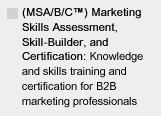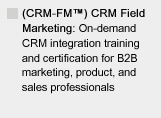MAKE SURE YOU CONTINUE TO RECEIVE EACH ISSUE OF TUESDAY MARKETING NOTES—CLICK HERE TO RENEW YOUR FREE SUBSCRIPTION
The New Marketing Model™: How B2B Marketers Put on-demand CRM and CRM Systems to Work to Align Marketing to Sales
By Eric Gagnon
Last week, we discussed the important changes brought about by on-demand CRM and other CRM systems to your role as a marketing manager inside your company (and if you haven’t yet downloaded our new eBook on this subject, click here or on the link to the left . . .)
But the changes introduced by CRM go way beyond learning to use the latest new technology, or adapting it to your company. When linked to millions of potential buyers in B2B markets like yours now using the Internet to find the products, services, and systems they need to solve their business problems, what we’re experiencing is a revolution in business marketing. The current ways we as marketers think about, plan, and manage our marketing programs are becoming less relevant to the new ways prospects are searching for, evaluating, and deciding on which business product to buy to solve their problem.
For example, prospective buyers are paying less attention to print advertising in trade publications and other conventional marketing media, and instead they’re searching for products using Google, and winnowing out potential suppliers based entirely on what they see and read on the Internet and on your Web site.
Josh Stailey of The Pursuit Group, a sales and CRM consulting firm, puts it best:
“The Web is turning the business-to-business selling process upside down: Buyers find and short-list suppliers based on their Web presence even before making contact. The decision has been made before you are even aware . . . and you’ll never know that you failed to make the cut.” [italics mine]
on-demand CRM and CRM Extends the Reach and Responsibility of Business Marketers
Another important change brought about by the onset of CRM systems and Internet-based communications expands the role of marketing, to more fully support the company’s sales team and to serve the prospect’s need for information after leads are generated, through effective lead development programs.
An effective marketing professional today is one who understands the need to both generate leads for sales, and the need to implement an ongoing lead development program to showcase their company’s special expertise and to build trust in the sales rep assigned to the prospect during the months- (or years) long purchase decision-making process.
This means using the new online media and e-mail, linked to CRM, to support sales by building the case for your product over these long B2B sales cycles. Building the case for your product is not the same as “building the brand,” which, in B2B, often degrades to a soft, unmeasurable, waste of marketing dollars and effort.
Sales support is the primary responsibility of B2B marketing professionals, but everyone who writes about business marketing seems to forget this. You know it, and I know it, but our profession seems reluctant or ashamed to admit this: Our job as marketers is to generate sales leads and work with sales to convert those leads to paying customers.
In Changing Times, Business Marketers Need to Change
But this is also a process of changing our mindset from mere communicators and ad agency go-betweens to active listeners and astute observers of our markets. It’s not enough to merely use the media tools at our disposal to reach our markets, we have to better understand what motivates prospects to buy our company’s products, and engineer the content required to address prospect questions, concerns, and expectations, and execute on the activities required to reach these prospects.
Whether you’re on the company side or the agency side, this means listening more to field sales reps at your company (or client) who actually talk to prospects, and less to others who don’t. It means developing a sensibility for what your prospects look for in your product and, most important, what problems they look to your product to solve, and then tailoring your marketing program to best present your product as the answer to this problem. Often this can mean tailoring a marketing program or a deliverable to an “audience of one,” specifically addressing a single prospect’s unique problem in the lead development process, by listening to and working with the individual sales rep who works with that prospect. This is truly sales support that makes you an indispensable contributor to sales and business growth in your company.
The “Sales/Marketing Disconnect”
A critical issue often exposed by companies introducing on-demand CRM, or other highly effective CRM systems, to their sales teams is the “sales/marketing disconnect,” occurring when the objectives and operation of a company’s marketing program do not meet the needs and objectives of the company’s sales team.
Companies have a sales/marketing disconnect wherever the company’s marketing program isn’t generating sales response, in the form of quality sales leads, for their company’s sales team, and where company marketing activities have not been developed so they can be tracked and measured for their return on investment throughout the sales cycle.
A sales/marketing disconnect is dramatically highlighted when sales teams using on-demand CRM or other CRM systems are able to track, follow-up with, and close their sales opportunities with unprecedented speed and efficiency, yet they observe their marketing departments continuing to run expensive, image-building ads that don’t motivate readers to contact the company, and can’t be objectively measured to assess their contribution to the company’s sales and top-line revenues. CEOs, CFOs, and sales executives in these companies can check on-demand CRM reports and dashboards to see up-to-the-minute reports of leads contacted, prospect status, and the dollar amount of potential and impending sales in the company’s pipeline, yet they can’t see the same kind of usable information from their marketing departments—only the vague results of “reader awareness” surveys, anecdotal information, and other subjective information they can’t reliably connect to their sales process.
In companies plagued by sales/marketing disconnects, usually the improvement that must be made is on the marketing side of the disconnect: Through clearer, more persuasive marketing programs that generate measurable sales response, through better, faster marketing execution, and by creating lead development programs to carry the company’s marketing program beyond the lead generation process, marketing professionals can close the sales/marketing disconnect and meet their primary responsibility, which is to increase their company’s sales.
The New Marketing Model™
The Business Marketing Institute (BMI) defines this drive for improved sales response and accountability in the business-to-business marketing field as the New Marketing Model™ (NMM), further defined as:
Using the techniques and principles of clear presentation and effective marketing execution to generate measurable sales response in every marketing activity, and supporting your sales team over the life of your company’s sales cycle by helping prospects understand how your product solves their problem or business issue.
The New Marketing Model sweeps away many of the faulty assumptions and inefficient practices of business-to-business marketing and incorporates effective practices and new technology to align the company’s marketing function more closely with sales, in order to help every business-to-business marketing professional achieve the goal of generating the sales response that increases sales for their company.
New Marketing Model: Core Principles
1. Knowledge of the Tradecraft of Marketing Execution
Learning how a thing is done, even if you’re not the one doing it: Poor marketing execution is often the leading cause of failure in business-to-business marketing programs, and is often caused by marketing professionals who treat the process of marketing execution of the advertising, direct mail, and other marketing projects in their program as a “black box:” A mysterious process to be handled by others and kept at arm’s length. Treating the critical process of marketing execution as a black box leads to breakdowns in effective execution of a marketing project, due to the marketing manager’s ignorance of the steps necessary to perform that project.
A marketing manager who knows the tradecraft of marketing—the essential procedures and skills required to execute every marketing project—develops respect for the process, leading to an appreciation for the amount of time that must be devoted to each step required to complete it. Knowledge of the critical elements of a marketing program, and respect for the process on the part of every marketing professional, means more marketing projects are completed on schedule, without degrading to last-minute rush projects due to a marketing manager’s lack of knowledge of the process. This is just as true for projects that are delegated to third parties, such as ad agencies or consultants, as it is for projects executed by marketing professionals themselves: Building knowledge of tradecraft, leading to respect for the process of marketing execution, means better coordination in the management of the day-to-day execution of every marketing project, and helps foster better working relationships with your marketing team.
2. Owning the Skills of Effective Marketing Execution
As companies have downsized through outsourcing, they have sometimes outsourced the core expertise that is critical to their operation, eliminating it inside their companies. This is especially true in the business-to-business marketing field, as many companies have outsourced too much of the essential knowledge required to effectively market their products to third party advertising agencies, marketing consultants, and other outside service providers.
Superior business-to-business marketing programs require strong marketing professionals inside the company who know how to sell their products, know what positioning and copy approaches work most effectively in their marketing programs, take charge of the critical role in setting their company’s positioning and marketing strategy, and can perform the many hands-on tasks required to execute their marketing plan: Writing a sales copy outline, sketching out a rough, initial idea for a competent ad or expedient marketing deliverable, or otherwise specifying and executing the marketing project required to meet the lead generation or lead development objectives of their marketing plan.
For marketing professionals, this means no one else should care more about your company’s marketing program than you. Knowledge of the tradecraft of marketing builds competence with repeated execution, and this competence should never be outsourced to your ad agency, a marketing consultant, or anyone else outside of your company. Effective training in business-to-business marketing builds your knowledge of the tradecraft required for you to develop, manage, and execute marketing programs that generate sales response, and establishes your value to your company by bringing this competence inside your company, where it belongs.
As a marketing professional, developing your skills in using on-demand CRM or other CRM systems, and using it as a tool for faster and better execution of your lead generation and lead development programs, adds to the share of skills you own and put to work for your company.
3. Marketing Aligned with Sales
As already discussed, sales support is your most important function in the business-to-businesss marketing process. In B2B marketing, your overall role as a marketing professional has three key parts:
• First, and most important, to support your company’s sales team by generating sales response—inquiries and leads—from your marketing program;
• Second, to work with your sales team, running a lead development program to convert these leads to buyers over your sales cycle, using various marketing tools and media to communicate to these prospects how your company’s expertise makes your company the best partner to the prospect, by effectively communicating how your product solves the prospect’s problem;
• Additionally, to run ahead of your marketing program to seek new markets and business development opportunities for your company, through new product launches, new market tests, and joint business ventures, all supported by additional marketing programs, executed by you and your marketing team
Ineffective, un-measurable marketing programs are often exposed when sales teams begin using CRM systems in their selling process. Suddenly, all sales leads are visible in the on-demand CRM database, for example, where they can be counted and tracked, along with each contact made and activity performed by the sales team to move the lead further along in the sales cycle. With a system that makes it far easier and far more efficient for each member of the sales team to manage and maximize contact with their prospects on a daily basis, communication becomes more substantive as open issues with the prospect, identified using on-demand CRM or CRM, are answered and addressed immediately and more responsively, using this more efficient method.
As these prospects become customers, and as sales can be tracked, using the CRM system, all the way back to the lead source, company executives begin to question the expense of the marketing programs that aren’t showing up in the CRM system as having generated many of those leads. This prompts companies to drop these non-performing marketing activities and to replace these expensive, unaccountable marketing projects with more effective marketing activities that generate sales response, re-aligning marketing to sales.
Next week, in Part 2 we’ll describe the other elements of the New Marketing Model, including basics of lead development and effective positioning using “Show What You Know” . . .
Eric Gagnon (eric@businessmarketinginstitute.com) is the author of the CRM Field Marketing Handbook, the core content study guide for the BMI CRM Field Marketing system.







